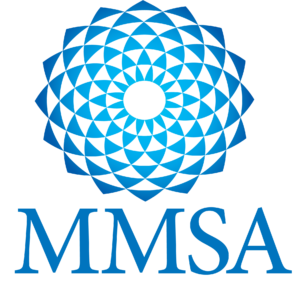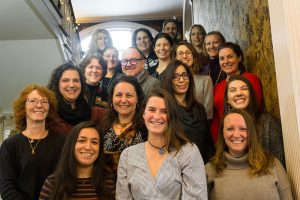 Through our professional learning opportunities and research/evaluation activities MMSA has been building capacity to meet the challenges we see ahead for STEM education in Maine and across the country. Check out these highlights and join us as we work together to create lasting systemic reform for STEM education!
Through our professional learning opportunities and research/evaluation activities MMSA has been building capacity to meet the challenges we see ahead for STEM education in Maine and across the country. Check out these highlights and join us as we work together to create lasting systemic reform for STEM education!
STEM Education Professional Learning Programming:
Where we have been:
The MMSA staff traveled to Maine, Missouri, New York and Vermont to share our work and build relationships with rural educators.
Who we work with:
- Informal afterschool educators from 43 states
- 41 cohorts totaling 430 educators
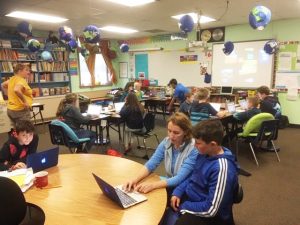
What’s next:
The ACRES team is looking ahead to 2020 as we we train other STEM educators across the country on how to become ACRES coaches. Visit ACRES for more information.
Where we have been:
- Waterfall Arts in Belfast
- Wintergreen arts in Presque Isle
- Fiddlehead Arts in Gray
Who we work with:
- 33 arts-oriented girls ages 12-16
- 4 AR Girls youth leaders
- 4 arts educators now leading AR Girls programming at their arts organizations
- 8 community science partners working with teams to revise and strengthen the AR experiences
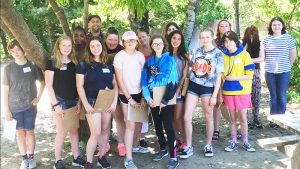
What’s next:
AR Girls is getting ready to recruit AR Girls for the Summer 2020 intensives and is researching how to expand AR girls to new organizations interested in serving arts-oriented girls and sparking their interest in STEM careers. Visit ARGirls for more information.
Where we have been:
The Experiential team traveled to Schoodic for a summer institute to identify community issues and design academically rigorous projects.
Who we work with:
Educators and student leaders from 6 schools: Maranacook Middle School, Hall-Dale Middle School, York Middle School, Lake Region Middle School, Maine Academy of Natural Sciences and Casco Bay High School.
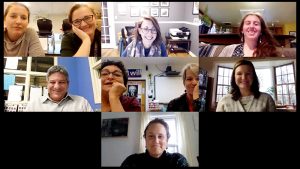
What’s next:
The Experiential STEM team is hosting a symposium where student leaders will share their progress to date as well as their plans for the future. Teachers will also share their experiences incorporating experiential STEM into their classrooms. Visit Experiential STEM for more information.
Where we have been:
- Bethel School District
- MMSA Symposium
- CSTA New England Regional Conference
Who we work with:
- Representatives from computer science businesses in Maine
- Educators from:
- RSU 4 MSAD 44 Bethel
- AOS 91 Mt. Desert Island
- AOS 94 Dexter School District
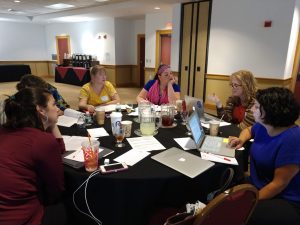 What’s next:
What’s next:
i2i will spend time this spring planning for the Spring CS Integration Symposium. We will also present our work at the RESPECT conference in Portland, Oregon. Visit i2i for more information.
Where we have been:
- Maine Curriculum Leaders Association
- Maine Principals Association
- Main School Management Association
Who we work with:
MMSA is part of a network within Maine, made up of University of Maine’s RiSE Center, the Maine Science Teachers Association, the Maine Department of Education, Gulf of Maine Research Institute and additional key science education leaders. The network supports Maine educators as the state transitions to an NGSS state.
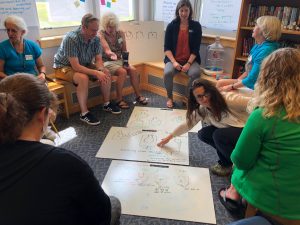
What’s next:
The professional learning support network is working collectively to develop a coordinated effort to provide educators with rigorous, high-quality, on-going professional learning in three-dimensional science teaching as we learn to support Maine educators.
Visit our professional learning page for more information.
STEM Education Research & Evaluation:
Census of Community-Based Environmental Learning
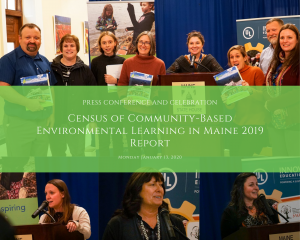 The Elmina B. Sewall Foundation generously supported a partnership between the Maine Mathematics and Science Alliance and the Maine Environmental Education Association. This project is taking the first steps toward building the capacity and networks for Maine schools and organizations that connect youth who are learning about the environment to their communities. We conducted a survey that received responses from 479 people representing 434 schools and organizations from every county in Maine.
The Elmina B. Sewall Foundation generously supported a partnership between the Maine Mathematics and Science Alliance and the Maine Environmental Education Association. This project is taking the first steps toward building the capacity and networks for Maine schools and organizations that connect youth who are learning about the environment to their communities. We conducted a survey that received responses from 479 people representing 434 schools and organizations from every county in Maine.
We publicly released a summary report of findings from the statewide survey initiative of in-school and out-of-school programs on January 13, 2020 in a joint press conference with the Department of Education. The report documents a comprehensive baseline understanding of the strengths and weaknesses in environmental education and provides a clearer understanding of how to equitably meet the needs of learners and educators today and in the future.
Visit the Census of Community-Based Environmental Learning to read the report and the program case studies.


